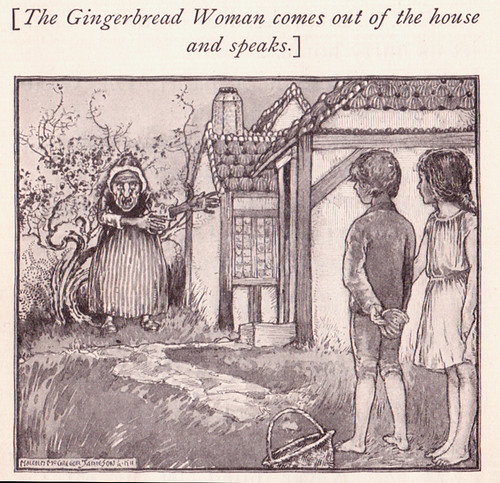Truly Grimm: German Fairytales Posted by Constanze on Mar 11, 2016 in Culture, Language, Literature
Guten Tag!

A depiction of a scene from Hansel und Gretel. Foto: perpetualplum on flickr.com under a CC license (CC by 2.0)
Most people will have heard of die Brüder Grimm (the Brothers Grimm) and their Märchen (fairy tales). Perhaps you’ll have read a few of them, or seen the Disney adaptations of these gruesome stories. But who exactly were these famous German brothers, and what is it like reading their fairy tales in German?
Jakob and Wilhelm Grimm, often referred to as die Brüder Grimm, were German academics, linguists and authors from the 19th Century, who re-popularised folk tales including Cinderella, Snow White and The Frog Prince. The original collection of folk tales was called Kinder und Hausmärchen (Children’s And Household Tales). They are also the authors of the Deutsches Wörterbuch – the largest, most comprehensive German language dictionary there is!
Some of the German titles of the Märchen include:
Cinderella – Aschenputtel
Hansel and Gretel – Hansel und Gretel
Rapunzel – Rapunzel
Rumpelstiltskin – Rumpelstilzchen
Sleeping Beauty – Donröschen
Snow White – Schneewittchen
A friend of mine recently gave me a (German) copy of Grimms Märchen, and reading it took me back to my childhood, as adaptations of these grisly stories were often on German TV (daytime/children’s TV!). There has always been some controversy surrounding Grimm’s fairy tales, with people saying they aren’t suitable for children because they’re too scary and violent. In fact, when they were first published, these tales were intended for adults, not children! But there have been many versions published over the years – some ‘scarier’ than others.
To demonstrate how different the Grimm stories are to the Disney adaptations, here is the last sentence or two of Rumpelstilzchen, Schneewittchen and Aschenputtel in my edition of the book (which is apparently very true to the originals):
Rumpelstilzchen (Rumpelstilzkin):

The original ending to Rumpelstilzchen by Wilhelm & Jacob Grimm. Own photo.
‘The devil said that, the devil said that’ the little man screamed, and in a violent rage he stamped his right foot so deep into the earth that it went in right up to his belly. Then, in his anger, he grabbed his left foot with both hands and ripped himself in half.’
Schneewittchen (Snow White):

The original ending to Schneewittchen by Wilhelm & Jacob Grimm. Own photo.
‘And when she [the wicked Queen] entered she recognised Snow White, and couldn’t move for fear and shock. But there were iron-clad slippers readily placed over a coal fire, and these were brought in with tongs and placed in front of her. She had to put on the burning-hot shoes and dance in them until she fell down dead.’
Aschenputtel (Cinderella):

The original ending to Aschenputtel by Wilhelm & Jacob Grimm. Own photo.
‘The doves pecked out one of each of their [the wicked sisters’] eyes. Afterwards, when they went outside, the older sister was on the left and the younger sister on rhe right: The doves pecked out their other eyes. And so they were punished for their wickedness and deceitfulness with eternal blindness.’
What do you think – too scary for kids? They’re just a little different from the ‘Prince saves the day and they all live happily ever after’ endings we all know and love! Do you prefer these or the Disney versions? 😉
If you’d like to have a go at reading Grimms Märchen in German, here are some links that will help you do just that:
Grimmstories.com – Grimm stories in German, English, and a whole host of other languages!
Germanstories.vcu.edu – Read the German story with the English translation right next to it.
Happy reading!
Related vocabulary – What words might you see in a German Grimm fairy tale?
Forest/woods – der Wald
Witch – die Hexe
Evil stepmother – die böse Stiefmutter
Evil stepsister – die böse Stiefschwester
Wolf – der Wolf
Poison – das Gift
Frog – der Frosch
Prince – der Prinz
Princess – die Prinzessin
Queen – die Königin
King – der König
Tower – der Turm
Magic – die Zauberei

Build vocabulary, practice pronunciation, and more with Transparent Language Online. Available anytime, anywhere, on any device.
About the Author: Constanze
Servus! I'm Constanze and I live in the UK. I'm half English and half German, and have been writing about German language and culture on this blog since 2014. I am also a fitness instructor & personal trainer.




Comments:
jon green:
My favorite as a child was “The Robber Bridegroom”. As an adult, I am somewhat shocked that my parent’s read it to me. It involves cannibalism and dismemberment. One of the story points involves the finger of a victim flying across the room and landing the the bride’s lap.
One of my favorite versions of Hansel and Gretel is the puppet play by Franz Graf von Pocci, one of the founders of the Munich marionette theater. In his version, the witch is a cannibalistic scientist who feels he need to consume something in order to better understand it.
Irene Hogan:
Very interesting read. As for whether we ‘prefer’ the tamer children’s style ending or these endings (the tamer versions are not exclusively ‘Disney’ versions) just try telling your small child one of these stories at night to try and help them sleep and you’ll soon learn which version you want to tell. These are folk tales and as such will always be changed and adapted over time and whichever audience they are for, which is wonderful, it makes them very dynamic.
Alcazar:
Being german, me knows the “original” versions of Grimms Märchen.
Yes, they are sometimes “scary” and gruesome, but so are fairy tales from other authors too, like Wilhelm Hauff or Hans Christian Andersen.
Alexis:
Wow….. @-@
This might be why my Mom hasn’t decided if I can read them! (I’ll read them one day though!)